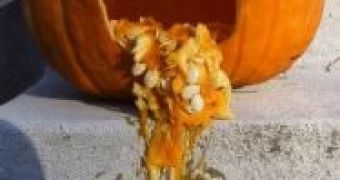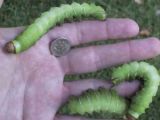We can be s**t scared.
But others might not be.
On the contrary, when spooked they barf. And announce you of it with an introductory belch. Some caterpillars will be distasteful for their predators, when they puke a foul brown fluid, after giving a warning.
Neuroethologist Jayne Yack at Carleton University in Ottawa made the investigation on green-colored common silkmoth caterpillars (Antheraea polyphemus), which mostly rely on camouflage for protection, and employ clicks and barfing as the last resort. "The upchucked fluid, and the advance clicking warning, are definitely effective deterrents," she said. "My cat got into a caterpillar bin at my house once. When I got home, there was a caterpillar that was still alive outside the bin with a long string of regurgitant trailing from it, and my cat was gagging. For years after that, whenever my cat saw a caterpillar, she started gagging. There's a strong learning component there, and the sounds can help with that", related Yack.
Scientists were puzzled for a long time for what may have served the audible sounds many caterpillars produce, like clicks, squeaks or crackles. The silkmoth caterpillars were long known to stay perfectly quiet on their own, but generating clicks like a watch ticking when they or their cage were touched.
The team simulated biting attacks by birds or insects with pinches to the heads of caterpillars, employing forceps, and also exposed them to live chickens.
The sounds were found to be made by snapping their tough mandibles, which present serrated, tooth-like ridges, and after vocalizing, the caterpillars often puked a foul brown fluid. The length and intensity of the clicks and the possibility of barfing were correlated with the intensity of the attack.
Chicken pecks, more powerful than the forceps pinches, triggered more clicking and regurgitation and none of the caterpillars was eaten by the birds. "Chemical defenses are costly to produce, and the caterpillar doesn't want to use it unless it absolutely has to, so it prefers giving a warning first," Yack explained. "In fact, if there is any regurgitated fluid left around its mouth, the caterpillar will suck it back in."
Experiments discovered at least two other species (out of 12) employing this defense mechanism - the tobacco hornworm (Manduca sexta) and luna moth caterpillars (Actias luna), thus this "strategy" could be quite common. "We would like to confirm that the sounds alone will deter an experienced predator," said Yack.
The team will also investigate the chemical composition of the regurgitated fluid, to see if it's synthesized by the caterpillars or it comes from plants they eat.

 14 DAY TRIAL //
14 DAY TRIAL // 
